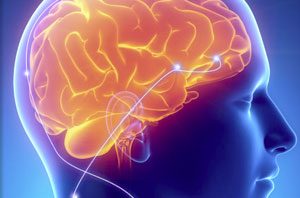Commonly seen in people over the age of forty, approximately 60,000 United States citizens are diagnosed with Parkinson’s disease every year. The magnitude of its affect along with its serious implications on the duration and the conditions of life give imperative reasons to understand this disease. While I do not believe medical practices should be catered to extending life, I do believe that modern medicine should seek to suppress its cognitive and motor affects. The only way to develop an affective treatment plan is to continue extensive research on the pathophysiology of this disease.

Characteristically, Parkinson’s disease causes the death of dopaminergic neurons in the portion of the brain known as the substantia nigra. Because of these neuronal deaths, patients suffer from dyskinesia which is the inability to control voluntary muscle contraction. Typically, patients display tremors, rocking back and forth, or fidgety movements. The real question, however, is what causes these neurons to die and why are these specific neurons affected?
It has been found through many neurodegenerative studies that the build up the protein, alpha-synuclein, is responsible for this dopamingeric neuronal death. Typically, this protein is found in the brain of healthy individuals, but at much lower concentrations. This is because the proteosome complex (proteins that breakdown other proteins) of healthy individuals use the enzyme Heme-oxygenase-1 to breakdown high levels of alpha-synuclein. In Parkinson’s disease patients, however, their brain has become resistant to this enzyme so there is no way to breakdown this protein leading to an aggregation of alpha-synuclein and eventually dopamingeric neuronal death. The use of heme-oxygenase-1 is a specific enzyme that is used in these cells to breakdown alpha-synuclein which leads to this neuronal specific cell death.

In order to suppress the impairment of Parkinson’s disease, it is essential to reestablish homeostasis in the part of the brain by degrading alpha-synuclein. Because of this, future research should focus on determining a reason why the brain becomes resistant to Heme-oxygenase-1 and develop a drug that could degrade this protein. If these goals were achieved, many friends, families, and patients would not have to go through the hardships caused by this disease.
As a student seeking a career in the medical field I think that focusing on this type of research would have many benefits to society as whole, not just those affected by Parkinson’s. This is because the knowledge gained in a study like this will take another step toward understanding the neurochemistry of the brain, hopefully leading to answers as to why these types of mutations arise in certain individuals. With this information we could better understand the impact of genetics and environment on neurodegenerative disease and help physicians detect and prescribe medications for these individuals. While I do not think we should seek to chase immortality, I do believe that as a society we should value the conditions of life and the complexity of our minds.
